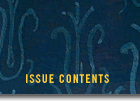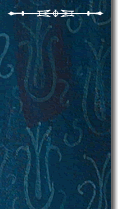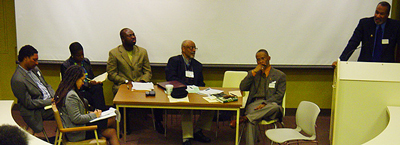


 |
 |
|
Around Tappan Square :: Page 9 :: WEBEXTRA Article 1 - Panelists Urge African American Studies Department...
Jump to Page 1 : 2 : 3 : 4 : 5 : 6 : 7 : 8 : >9< : 10 of ATS
Panelists Urge African American Studies Department to Push Interdisciplinary
Boundaries Ever Further
By Channing Joseph ’03
::::
 As Herman Beavers (far right, at podium) delivers his presentation, the other panelists listen and take notes. From left to right, they are Pam Brooks, Greg Hampton, Meredith Gadsby, Akwasi Osei, James Millette, and Maghan Keita. Photo by Eva Green ’06. |
What will keep African American studies a viable discipline in this new century? As part of the 30th anniversary of the African American studies department, a recent panel discussion featuring faculty and alumni experts offered opinions and suggestions for the future of the subject. Everyone agreed on one thing: the discipline must retain—and expand—its inherent interdisciplinary nature.
::::
Thirty years ago, the unflagging efforts of several Oberlin faculty
members and many committed students gave birth to the African American
Community
and Student Development Program, the precursor to today’s Department
of African American Studies.
The new program’s leaders took a wide view of what could come
under the aegis of African American studies, and the early curriculum
included
courses in anthropology, the dramatic arts, education, English, history,
psychology, sociology, and the social sciences.
That willingness to make broad connections—to construct a truly
interdisciplinary program—is the likely key to the department’s
future success.
That was the main point of agreement among the two faculty members and four alumni who participated a panel discussion titled “The Present and Future of African American Studies at Oberlin.” The event took place April 12 as part of the department’s 30th anniversary celebrations. Moderated by Professor of African American Studies James C. Millette, the panel was also a session in the Great Lakes Colleges Association Black Studies Conference, held concurrently on Oberlin’s campus.
During the presentation, the experts discussed how Oberlin’s department could build on its successes and remain vital in the decades to come.
To begin, start with knowing your past, advised Maghan Keita ’72, one of the primary student activists involved in molding Oberlin’s program.
“In convention, Oberlin is that radical, liberal space that ‘created’ a great many of us,” said Keita, now associate professor of history and chair of the Africana studies program at Villanova University. Keita recounted that while reading Willard B. Gatewood’s Aristocrats of Color: The Black Elite recently, he learned two interesting facts. First, that from its origin through 1920, Oberlin educated more of the black intelligentsia than any other institution in the country, and second, that at the beginning of the Civil War, one-third of the Oberlin student body was black. “For me, with this revelation, revision begins. Oberlin receives a radical ‘rethink,’” he said.
The first blacks at Oberlin included such noted individuals as John Mercer Langston, one of the first African American lawyers in the U.S., and Mary Church Terrell, the first African American to be appointed to a board of education and a founding member of the National Association of Colored People (NAACP). The intellectual caliber of those first blacks at Oberlin assured their success, Keita said, and the success of the College and the success of its black students “were bound in reciprocity.”
“Oberlin became what it is because of the active participation and agency of very talented black people from its very inception,” he emphasized.
In his generation, Keita said, he and other Oberlin black students “were told that we were an experiment.” No one—black or white—challenged this assertion because no one knew Oberlin’s history. Understanding the history of blacks at Oberlin led him to realize that “there is a certain inevitability to the success of black folk and what they begat at Oberlin,” Keita said.
This history of success extends to today’s African American studies department, he said.
“What some regarded as an experiment with serious drawbacks, initiated
by students with dubious credentials, 30 years later is recognized as
an area of dynamic and exceedingly broad scholarship across the country,”
Keita declared. But he warned that the discipline is in danger of becoming
“mired in an Afro-Americo-centric nexus,” and urged scholars
to continue to develop new areas of study and to broaden the discipline’s
intellectual and academic constituencies.
Panelist Herman Beavers ’81 heartily agreed, but noted, “African
American studies’ biggest issue in the 21st century comes down to
the issue of space. The discipline has not been successful in displacing
white supremacy as the animating force of the academy.” Beavers
is associate professor of English and a core faculty member in the
Center for Africana Studies at the University of Pennsylvania.
“If African American studies does not reach out to people in the sciences, I daresay we will have a very difficult time supplanting white supremacy. We’ve mapped the human genome. As African American scholars, we need to be involved in that conversation. Eugenics is still with us,” Beavers added, referring to the late 19th- and early 20th-century social policy based on the pseudo-science called eugenics. The policy encouraged the reproduction of people with “good” genes and discouraged the reproduction of those with “bad” or “inferior” genes.
Beavers also discussed how other academic disciplines often incorrectly view issues relating to black peoples or cultures as the sole domain of African American studies. Thus, he said, if black studies programs neglect the sciences, it’s possible that few scientific studies will be conducted to determine the impact of recent discoveries on African Americans.
“By definition, African American studies must be interdisciplinary,” concurred Akwasi Osei ’80, associate professor of history at Delaware State University and former director of Oberlin’s Afrikan Heritage House. Adding a pragmatic twist to the discussion, he said, “If it doesn’t translate into making people’s lives better, then we might as well forget it.”
Panelists also discussed other measures to insure the future vitality of African American studies. Beavers emphasized that students and faculty members should not forget that service and activism are important components of African American studies. He quoted the Brazilian educator Paulo Freire, saying, “The goal for a pedagogy of the oppressed is to restore lost humanity and thereby liberate both the oppressed and the oppressor.”
Meredith Gadsby, assistant professor of African American studies at Oberlin, stressed the other facets of faculty members’ professional obligations, teaching and scholarship. “We are heavily invested in a narrative of professionalism, but you can’t really do this work if you don’t love students,” she said.
Oberlin’s other faculty panelist, Assistant Professor of African American studies Pam Brooks, commented on the differences between her experiences as a student at New York University in the 1970s and the events occurring in Oberlin at that time. While students at Oberlin were successful in helping to establish a program, at NYU, she said, “our voices were, in a sense, muted. We were underutilized.”
Greg Hampton ’91, assistant professor of English at Howard University,
summarized the panel’s wide-ranging discussion succinctly, saying, “African
American studies is necessarily about several things simultaneously.
The discipline is already solidified, yet it remains malleable.”
Related Links
John Mercer Langston
www.oberlin.edu/external/EOG/OYTT-images/JMLangston.html
John Mercer Langston and Oberlin's Antebellum African American Heritage
www.oberlin.edu/external/EOG/Langston/Cheek.html
Langston House
www.oberlin.edu/external/EOG/HistoricPreservation/HPLangstonHouse.html
Selected Speeches by John Mercer Langston
www.oberlin.edu/external/EOG/LangstonSpeeches/langston_menu.htm
Mary Church Terrell
www.loc.gov/loc/kidslc/sp-terrell.html
www.tnstate.edu/library/digital/terrell.htm
voices.cla.umn.edu/authors/TERRELLmarychurch.html
![]()